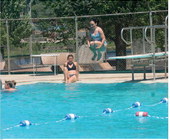Labor shortage


City looks at options to attract more lifeguards
NEWS EDITOR
After struggling to fill shifts this summer, the city of Medford is looking at ways to attract more lifeguards to work at the city pool.
At Monday’s city council committee of the whole meeting, aldermen reviewed a list of recommendations from staff as to ways to make working at the pool more attractive.
A suggestion to scale back hours of operation met with sharp opposition from aldermen. City coordinator Joe Harris had proposed going from the current schedule of being open from 1 to 4:30 p.m., having adult only from 5:30 to 6 p.m. and reopening from 6 to 8 p.m. to being open from 12:30 to 5 p.m. with adult swim from 5 to 5:30 p.m. and not reopening in the evening.
Alderman Tim Hansen opposed eliminating the evening hours noting that based on attendance statistics kept by the pool attendants, it would eliminate a third of pool patrons from being able to use the pool. “These kids want a life outside of working,” said city coordinator Joe Harris.
Last summer, the city started with 12 lifeguards on staff and by the end of the summer was down to nine. The lifeguards, all of whom were high school and college aged workers were at times working up to 10 days in a row without a day off. Issues became worse into August when high school sports and band started competing for the workers’ time.
Mayor Mike Wellner clarified that the ideas being proposed were simply a place to start the discussion. He noted at times when he has gone by the pool later there have been situations where there are more lifeguards than kids in the pool. It was noted that the attendance records list when people arrive at the pool but not when they leave. It was suggested that while a number may come for the evening shift, they could leave before the 8 p.m. close.
“By 7:30 p.m. you have a handful of kids,” said city clerk Ashley Lemke.
Alderman Greg Knight also opposed eliminating the evening hours entirely but suggested they could look at scaling back to 7 p.m. instead of 8 p.m.
Wellner said that if the city was able to hire 16 lifeguards they wouldn’t need to consider changing hours. “If they are going to work 10 days in a row, we are going to lose them,” Wellner said. “We have to be prepared to change some things.
Alderman Mike Bub agreed that they needed to focus on ways to attract new lifeguards however he was adamant about not eliminating evening hours.
“I absolutely don’t support that,” he said, noting that evening is the only time when many of the taxpayers who pay for the maintenance and upkeep of the pool are able to use the facility during the week.
“I understand the lifeguard issues,” Bub said, noting that they must look at a better way to recruit lifeguards. He cited his time as a college student wanting to earn as much money as possible over the summer to pay for school and that reducing the number of hours available could end up backfiring on the city as workers choose to go elsewhere.
Alderman Christine Weix said she had brought the concerns to Lemke last summer. “Our staff are teenagers,” she said, noting that with the work schedule and other activities they are not getting any time to rest.
Harris said times have changed from when Bub was in college. “Kids want a life, they need a life after 6 p.m.,” he said. “We have to change something.”
Wellner said they needed to get back on track and refocus on what they can do to get more lifeguards hired noting that if they can get to full staff anything else will be a moot point.
One suggestion Wellner made was for the city to pay the $180 fee for prospective lifeguards to get their certifi cation, perhaps with it being reimbursed following them completing a season or two of work.
In the past, the school district had a certified instructor on staff who would offer the certification as part of a class. At that time, there would typically be many lifeguards to choose from. With it no longer being taught as a class, prospective lifeguards must sign up and take the certification which is offered one time a year locally.
One of the suggestions proposed was for the city to hire an instructor and work with the school district to host their own classes at the school district pool more times during the year.
“The school district isn’t helping us out,” Knight said, noting that the number of available lifeguards has declined in the community because of the school not offering the class.
“I agree we have to look at alternatives,” Bub said, noting the city has to make an investment in attracting lifeguards and keeping the pool open to the taxpayers who are paying the bill for it. There were suggestions to giving them additional bathing suits or sweatshirts and hats. He described these as being small perks to make it a better job.
Other suggestions are to do additional advertising and target recruitment toward adults as well as younger people for the work. Even then, the city may have to make changes to the hours, with aldermen split on the value of the adult-only hours which last year recorded just 65 recorded attendees out of over 12,000 pool users. Lemke noted that because the attendants do not work over the adult swim hour, the record keeping for attendees is spotty.
“There is a solution out there,” Wellner said. In the end, Bub, Weix and Laura Holmes volunteered to be on a working committee to continue addressing the issue of how to attract and retain lifeguards and will bring a recommendation back to the council.
Chamber of Commerce lease
A proposal to continue to waive rent for the Medford Area Chamber of Commerce use of a city-owned building drew questions and opposition from Knight.
Last year, in light of COVID-19’s impact on the local business community, the city council had waived charging the Chamber rent. Now, with the city looking to renew the terms of the longterm lease agreement for another three years, Wellner urged aldermen to continue to waive the building rent.
According to city clerk Ashley Lemke, the lease agreement has not been in writing for the past few years and in efforts to make it more transparent they are bringing it forward now.
“What is the justification for needing to waive it?” Knight asked.
“I think it is counterproductive to charge the Chamber,” Wellner replied, noting the amount of work the Chamber does on behalf of the city and in promoting the community. He said he has always opposed the idea of charging the Chamber rent. “It was something that was always there but I didn’t agree with,” he said. Wellner also cited the ongoing impacts to business due to the pandemic.
Knight noted that at one time the rent was going into a nonlapsing fund to help cover major building repairs. City coordinator Joe Harris explained that the fund set for that is capped with a current balance of $25,000.
“$25,000 doesn’t sound like much to me,” Knight said, of the cost of potential future repairs.
Under terms of the lease, the Chamber is responsible for regular maintenance of the building as well as 50% of the cost of major maintenance projects. As with other city-owned buildings the city takes care of snow removal and lawn mowing.
“The chamber does a lot of good things for the city,” Harris said, of the working relationship between the city and Chamber.
“The city already supports the Chamber a good bit,” Knight said.
Despite Knight’s objection, aldermen voted to recommend approving the three-year lease agreement with no rent being charged. Knight voted against the measure. It will go the full city council next week.

Work on the city’s third water tower is underway. The tower will be erected near Shattuck Street and is part of a long-range plan to improve water flows on the northern area of the city. The new tower is scheduled to be erected before the end of the year.EMILY GOJMERAC/THE STAR NEWS

Ben Brooks presented the Wisconsin Wastewater Operator of the Year award to Brooke Zondlo. She was recognized at the state conference held last week. The award recognizes her outstanding efforts in wastewater plant operation.BRIAN WILSON/THE STAR NEWS




